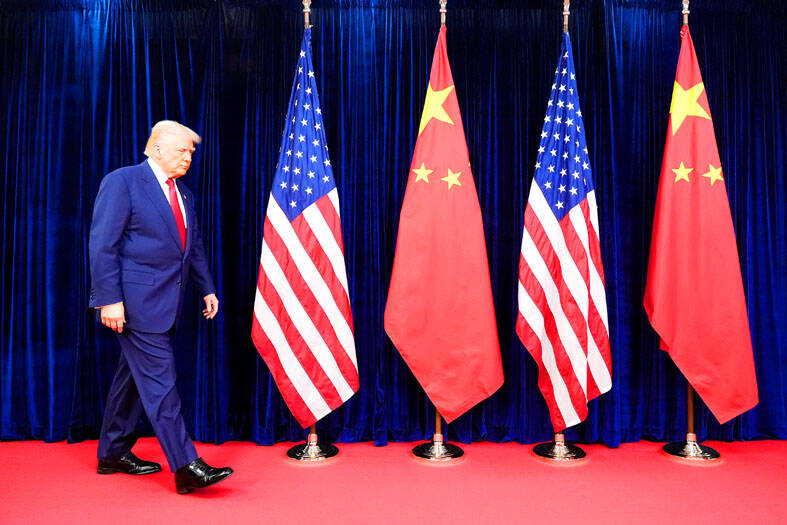US President Donald Trump appears to be downplaying the Taiwan issue, given his omission of the topic from public discussions of talks with China, experts said yesterday.
Only China’s state-run Xinhua news agency reported that Chinese President Xi Jinping (習近平) highlighted “China’s principled position on the Taiwan question, underscoring that Taiwan’s return to China is an integral part of the post-[World] war [II] international order” during a telephone call between the two leaders on Monday.
A social media post Trump wrote about the call did not mention Taiwan.

Photo: AP
From Monday’s omission as well as Trump’s speeches over the past few months, it is evident that he wants to downplay the Taiwan issue in terms of US-China relations and Japan-China relations, Graduate Institute of East Asian Studies professor Ding Shuh-fan (丁樹範) said.
The two also did not discuss Taiwan during their meeting the sidelines of this year’s APEC summit in South Korea, Ding said.
It is interesting that Trump wants to downplay the Taiwan issue, perhaps due to its sensitivity or perhaps because of leverage he can derive from it, Ding said, adding that the silence is a good thing for Taiwan on some level.
The US and China highlighting different parts of a conversation, while neither denying nor affirming what the other side said, is an established routine for US-China talks, said Yen Chen-shen (嚴震生), a professor in National Chengchi University’s Department of Political Science.
Trump was not in a position to support or criticize Japan’s position, and Washington and Beijing could only continue their discussions by refraining from commenting on the issue or refuting China’s comments, Yen said, referring to a spat between China and Japan over Japanese Prime Minister Sanae Takaichi’s comments on a potential invasion of Taiwan.
Once either the US or China have stated that it does not agree with the other on the Taiwan issue, it would likely be a moot point in future meetings, he added.
Bonnie Glaser, managing director of the Indo-Pacific Program at the Washington-based German Marshall Fund, said that the telephone call might have been initiated by Trump, as he might have wanted to “solicit Xi’s help” given the attention on a Russia-Ukraine peace plan proposed by Trump.
“It is likely that Xi opted to use the opportunity to make a statement about Taiwan,” Glaser said in an e-mail.
Trump understands that Taiwan “is a third-rail issue in US-China relations” and has been “very cautious when talking about Taiwan, including when he has been asked whether the US would defend Taiwan if attacked,” she said.
Neil Thomas, a fellow for Chinese politics at the Asia Society Policy Institute’s Center for China Analysis, said that China does not expect the US to abandon Taiwan.
However, “Xi’s growing confidence in his relationship with Trump — and the warm afterglow of the APEC summit — has him sensing an opportunity to use Washington to gain diplomatic leverage against Tokyo,” he said.
Trump’s call was a chance for Beijing to gauge his administration’s stance on the issue, send the message that Washington should not support Takaichi’s comments on Taiwan and remind Trump of the highly sensitive nature of cross-strait issues, said Wu Xinbo (吳心伯), an adviser to the Chinese government and director at Fudan University’s Center for American Studies.
“The US should handle the Taiwan issue very carefully,” Wu said, adding that he expects the issue to feature more prominently between now and Trump’s expected visit to Beijing in April.
Additional reporting by Bloomberg and CNA

Taiwanese can file complaints with the Tourism Administration to report travel agencies if their activities caused termination of a person’s citizenship, Mainland Affairs Council Minister Chiu Chui-cheng (邱垂正) said yesterday, after a podcaster highlighted a case in which a person’s citizenship was canceled for receiving a single-use Chinese passport to enter Russia. The council is aware of incidents in which people who signed up through Chinese travel agencies for tours of Russia were told they could obtain Russian visas and fast-track border clearance, Chiu told reporters on the sidelines of an event in Taipei. However, the travel agencies actually applied

Japanese footwear brand Onitsuka Tiger today issued a public apology and said it has suspended an employee amid allegations that the staff member discriminated against a Vietnamese customer at its Taipei 101 store. Posting on the social media platform Threads yesterday, a user said that an employee at the store said that “those shoes are very expensive” when her friend, who is a migrant worker from Vietnam, asked for assistance. The employee then ignored her until she asked again, to which she replied: "We don't have a size 37." The post had amassed nearly 26,000 likes and 916 comments as of this

New measures aimed at making Taiwan more attractive to foreign professionals came into effect this month, the National Development Council said yesterday. Among the changes, international students at Taiwanese universities would be able to work in Taiwan without a work permit in the two years after they graduate, explainer materials provided by the council said. In addition, foreign nationals who graduated from one of the world’s top 200 universities within the past five years can also apply for a two-year open work permit. Previously, those graduates would have needed to apply for a work permit using point-based criteria or have a Taiwanese company

The Shilin District Prosecutors’ Office yesterday indicted two Taiwanese and issued a wanted notice for Pete Liu (劉作虎), founder of Shenzhen-based smartphone manufacturer OnePlus Technology Co (萬普拉斯科技), for allegedly contravening the Act Governing Relations Between the People of the Taiwan Area and the Mainland Area (臺灣地區與大陸地區人民關係條例) by poaching 70 engineers in Taiwan. Liu allegedly traveled to Taiwan at the end of 2014 and met with a Taiwanese man surnamed Lin (林) to discuss establishing a mobile software research and development (R&D) team in Taiwan, prosecutors said. Without approval from the government, Lin, following Liu’s instructions, recruited more than 70 software